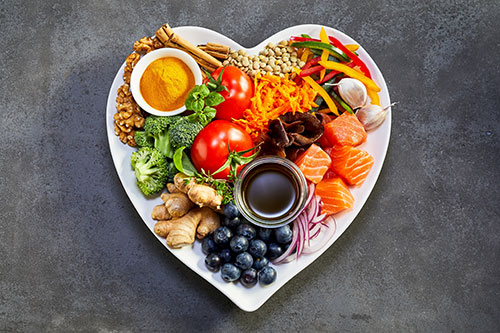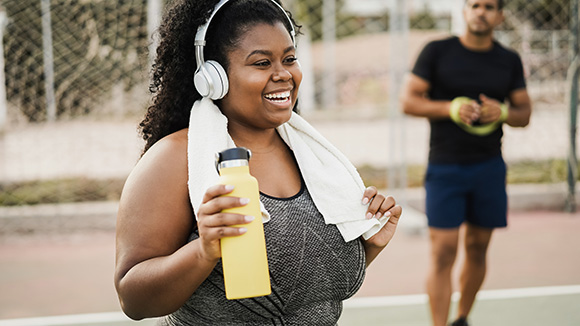The Coastline Blog is excited to introduce a brand new weekly blog series focusing on mental health featuring guest contributor Claudia Vernon, Coastline College’s Director of Student Mental Health Services! Every Monday you can look forward to a new “piece of mind” blog with insight, tips, and resources about mental health. To kick off the series, let’s dive into a delicious and nutritious Healthy Mind Platter and learn how to best balance all the important ingredients to balanced mental health!

I’m often asked, “What does mental health and wellness mean?” How does a person create and maintain mental health and wellness? And how do you know you’ve attained it? Other forms of health don’t seem so nebulous because they have rubrics, metrics, and standards associated with them. For example, if I told you my A1C was 7.2, you’d know that I have uncontrolled high blood sugar or diabetes. If I told you that my body temperature is 102°F, you’d know that I have a fever, and something is brewing in my body. However, if I told you I had poor sleep last night, or felt sad today, or produced less than usual work, that doesn’t necessarily equate to poor mental health.
What is mental health or mental well-being? The simplest and most understandable definition is feeling good while functioning in a satisfactory manner. This makes mental health a very subjective experience. Even so, there are clear objective indicators of poor mental health as is seen in such situations that involve addictions, self-harm, or eating disorders, to name a few.
Learn More About Mental Health Services @ Coastline
The bigger question is how is mental health attained and maintained? Dr. Daniel Siegal, Executive Director of the Mindsight Institute and Clinical Professor at the UCLA School of Medicine, and Dr. David Rock, Executive Director of the NeuroLeadership Institute, came up with 7 essential “mental nutrients” needed to attain and maintain mental well-being and wellness and named it the Healthy Mind Platter. They got their inspiration from the USDA’s “Choose My Plate” concept that depicts the portions of each food group you should have daily to support physical health.
To start off this new blog series, each week a different “mental nutrient” will be showcased so you can have a better understanding of how to maintain a healthy mind. Before we dive into the first one we’re going to look at - Physical Time - let’s get familiar with each one:

Focus Time
When we closely focus on tasks in a goal-oriented way, we take on challenges that make deep connections in the brain.
Playtime
When we allow ourselves to be spontaneous or creative, playfully enjoying novel experiences, we help make new connections in the brain.
Connecting Time
When we connect with other people, ideally in person, and when we take time to appreciate our connection to the natural world around us, we activate and reinforce the brain's relational circuitry.
Physical Time
When we move our bodies, aerobically if medically possible, we strengthen the brain in many ways.

Time In
When we quietly reflect internally, focusing on sensations, images, feelings and thoughts, we help to better integrate the brain.
Downtime
When we are non-focused, without any specific goal, and let our mind wander or simply relax, we help the brain recharge.
Sleep Time
When we give the brain the rest it needs, we consolidate learning and recover from the experiences of the day.
“The Healthy Mind Platter has seven daily essential mental activities necessary for optimum mental health. These seven daily activities make up the full set of “mental nutrients” that your brain and relationships need to function at their best. By engaging every day in each of these servings, you promote integration in your life and enable your brain to coordinate and balance its activities. These essential mental activities strengthen your brain’s internal connections and your connections with other people and the world around you.” - Dr. Daniel J. Siegel
Explore Mental Health Awareness @ Coastline
Like food, if we eat too much of one food group or deny ourselves nutrients, our bodies react negatively. So it is with “mental nutrients,” we can have too much of one thing or fail to partake of a certain “Time” group and we begin to experience mental unwellness. The nutrients on the Healthy Mind Platter are not meant to be ingested in equal parts. For example, just as I should eat more servings of fruit and vegetables than of protein, sleep automatically accounts for 1/3 of the Time groups. The key is balancing the needs of your mind, soul, and body.
We also often combine our “mental nutrients.” My salads often consist of veggies, fruit, nuts, meats, cheese, oils; add croutons and I have all my food groups in one meal. I may spend all day Saturday hanging out with friends (Connecting Time) at the beach where I sunbathe (Downtime) for stretches of quiet time. Or I may play on a softball league (Play Time and Physical Time) and go out for drinks with my team after the game (Connecting Time). Or I may be crafting raised garden beds (Focus Time and Physical Time) and get lost in the flow of work which allows my mind to self- reflect (Time In). In all those scenarios, I am combining essential mental nutrients. Whichever way you wish to balance your Time servings, all mental nutrients should be ingested every day.

Physical Time
We all know that we should spend time being physical, exercising, moving our bodies, and we all know the benefits of this. So, let’s spend some time self-reflecting and troubleshooting how we can “ingest” mental wellness via physical time by answering the following questions.
Just like how a clock ticks smoothly with regular tune-ups, our minds thrive on the steady rhythm of physical activity. Investing in your physical health is a vital ingredient to a well-balanced state of mental wellness. So, whether it's hitting the gym, taking a stroll in nature, or simply taking the stairs in place of the elevator, investing in physical time is more than just a health kick—it's a powerful way to nourish our minds and build resilience for whatever life throws our way.
Claudia Vernon has been a Mental Health Therapist at Coastline since the department’s inception in January of 2019 and became Director of Student Mental Health Services in July of 2023. Claudia earned her B.A. in Social Work from Cal State University Long Beach and an M.A. in Social Work from Barry University, Florida with an emphasis in trauma-informed clinical practice. She has been practicing as a Licensed Clinical Social Worker (L.C.S.W.) for approximately 20 years. Claudia has also provided clinical supervision to countless graduate student interns and post graduate associates in the mental health field for over 15 years. To learn more about Claudia and Coastline's other Mental Health Therapists, visit the Student Mental Health Services webpage.